Tekken, Mortal Kombat 1, and Street Fighter 6 prove that monetization is the next major hurdle for fighting games - but what's the answer?
With Netcode largely handled well, monetization is the next major hurdle for the genre.
I've played Guilty Gear: Strive, Tekken 8, and Street Fighter 6 against people in the states over the weekend, and I think it's safe to say that the war for better netcode in fighting games is pretty much won at this point.
We've got developers delaying games to make sure their online functionality works well, which is as much a green flag as you can get. But when one war ends, another starts. It's pretty clear to me that the next major hurdle for the genre will be about monetization - extracting money from you beyond the initial sale of the game. It's inevitable as fighting game developers hurdle towards a live service-dominated industry.
It's proving to be a tricky battle. Tekken 8 is the most relevant game, lately, to fumble its post-launch monetisation strategy. In aiming to do something that both made Bandai Namco some money, and appealy fairly to players, it looks like it fell short of either goal.
With the release of Heihachi, his stage, featured in the story mode and quite important to the overall competitive future of the game, was sold for $5. Ergo; it isn't included in the season pass. This left many confused as to why they're earlier purchases of a season-wide content pass didn't include all the goodies. Harada had to step forward and try to explain what had happened (before deleting said explanation), and the game remains negatively reviewed on Steam.
Street Fighter 6 has avoided such PR problems, but has recieved critisism towards the price of its post-launch cosmetic events and DLC. Even so, what it's given out alongside each season has gotten better over time, it's just the price that's proven tricky for some to swallow.
Then there's Mortal Kombat 1, a game that has implemented its IAP strategy so aggressively and boldly that pretty much no-one has anything good to say about it (even the ever-loyal MK fans are getting a bit peeved, at this point). But, it's clearly working for WB Games - are we, as players, rewarding their bad behaviour?
With all three marquee games clearly focusing on selling off extra content (as fighting games have in the past), but taking slightly different routes through the problem, developers at Capcom, WB Games, and Bandai Namco are running into a serious dilemma: with video games most expensive than ever to make and maintain, is the tried-and-testing way of doing things enough? And if it is, how do you convince players to continually bite?

I can promise you this: those separate from the development team, those in live ops and the financial sides of each company, are giving this some thought. Fighting games don't exist in a vacuum, they never have. More so now than ever before, fighting games will be compared to other games from other genres, which are being min/maxed to generate as much money as possible during their shelf life.
While Capcom seems content with releasing great games with typical post-launch DLC, Bandai Namco, especially, has been looking for new ideas on how to rake in the cash: see its attempt at making an MMO with Blue Protocol, which, notably, crashed and burned.
As with most things, the most ambitious approaches can be seen away from the old guard. Cygames has been doing pretty solid with Granblue Fantasy Versus: Rising, offering a free-to-play version of its game with a limited cast of playable characters in hopes of tempting over a wider base of players who can then ideally spend widely on the full cast of characters if they're so including, combining efforts to both lower the barrier of entry and get people spending money. Cygames is also selling loads of character recolours, weapon sets, and DLC characters, too, attacking the monetization problem on multiple fronts.

What this problem needs is a first game to go really bold and break through the brick wall, opening a path for other series to follow. For the netcode problem it was Guilty Gear Strive, which showed the world how well a game with good netcode could perform during the height of COVID. For monetization, it could well be Riot Games' 2XKO. Totally free-to-play, it'll be financed like all of Riot's games; with post-launch cosmetics and DLC. Even the alpha test had a battle pass and unlockable character skins! If Riot can make a game that's free, but generates a boat load of revenue, as League or Valorant does, then it'll light a flare for other games to follow suit.
Or, maybe, 2XKO will fail spectacularly at this. It's easy to think back to the fight for better netcode as a casualty-free venture, but that's simply not the case. Plenty of games tried to implement good online and failed, like Samurai Showdown. There will be games that try, and fail, to get this right, and will lose millions in the process. Don't believe me? Look at live-service shooters that are built around this very model. They've been doing it longer than any other genre, and still we see games come out and mess it up. It's a perilous road.
But it's one that will surely be travelled. I, like many, quite like the simple strategy of releasing a full price fighting game and selling characters and costumes. But again, fighting games don't exist in a vacuum, and efforts to transform them into money printers will inevitably happen. Hell, it already kind of is. You can even see what Multiversus is doing as trail-blazing, to a degree, if you're feeling generous. Like the fight for better netcode it's something the community will have to remain vocal about, and it's sure to rage on for years.

